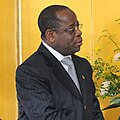| President of the Council of Ministers of the Togolese Republic | |
|---|---|
| Président du Conseil des Ministres de la République togolaise | |
 | |
| Type | Head of government |
| Member of | Council of Ministers |
| Reports to | |
| Nominator | President |
| Appointer | President |
| Term length | At the pleasure of the President Six years, renewable indefinitely |
| Formation | 27 April 1960 |
| First holder | Sylvanus Olympio |
 |
|---|
This is a list of prime ministers of Togo since the formation of the post of prime minister in 1960, to the present day.
Contents
- History of the office
- 1991 conflict with the presidency
- 2024 constitutional reform
- Duties and competences
- List of officeholders
- Timeline
- See also
- References
- External links
A total of thirteen people have served as Prime Minister of Togo – twelve men and one woman. Among them, one person, Edem Kodjo, has served on two non-consecutive occasions.
The incumbent prime minister, Victoire Tomegah Dogbé, was appointed by president Faure Gnassingbé. She took the oath on 28 September 2020.













